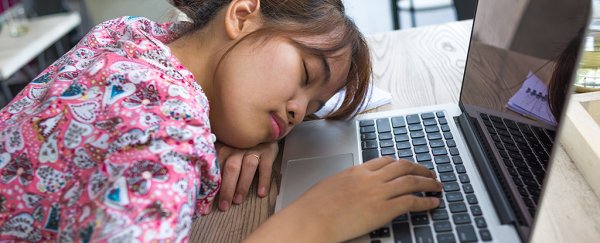Giving adolescents a few more minutes of shut-eye in the morning might not only make them better rested for their studies, it could provide a much needed boost to their wellbeing.
A shift in the timetable of a Singaporean high school has provided researchers with an opportunity to study the effect sleep time has on students, revealing benefits that could change how we structure a typical school day.
In 2016, a leading all-girls school in Singapore decided to push back the start of their day from 7:30am to 8:15am, giving students a little more time to wake in the morning.
With permission for their parents, a team of neuroscientists from the country's Duke-NUS Medical School investigated the effect this had on the students' alertness and sense of wellbeing.
The impact sleep has on the education of adolescents has been well-studied, especially among western demographics.
But many of these studies suffer from a problem of novelty – students might improve at first with an unexpected lie-in, but it's possible that this bonus could soon be used to justify a later bedtime.
There is also the question of whether students experiencing the academic pressures of an eastern education system would benefit in the same way.
Compared to education in westernised nations, schools in the east typically start earlier and require a higher workload.
It's been hypothesised that giving adolescents more time to sleep in would simply allow them to burn the candle later into the evening, resulting in no real net benefit. But now it looks like data doesn't support this idea.
In this study, a total of 375 teens were initially involved, covering grades 7 to 10 with an average age of just under 15.
By the end of the 9 month investigation the school's year 10 students had graduated, leaving fewer than half of this sample.
A close look at their sleep times and reported levels of tiredness and happiness showed the extra 45 minutes made a significant difference overall.
After one month, bed times had slipped on average by only around nine minutes, while still providing an extra 23 minutes under the covers. More students also got a decent 8 hours sleep, compared with before.
Nine months later bed times continued to slide, but only by another couple of minutes. The total amount of extra time spent in bed was still close to 20 minutes, amounting to an estimated 10 minutes of extra sleep.
That might not sound like much, but according to the students, it was enough to lift their energy levels and overall well-being.
It's hard to say whether this trend would continue over ensuing years, but it does demonstrate that a change in a school's timetable would have some relatively long-lasting benefits for some students.
Keep in mind that this was just one school made up of female students, and the sample size shifted with time and depending on the measurements being taken.
Still, it's one more study that suggests we ought to give some serious thought to structuring the school day around the biology of our kids, rather than the pressures of society.
Sleep deprivation isn't just a matter of needing an extra cup of coffee in the morning – it's slowly being regarded as a significant problem, linked to debilitating health conditions such as Alzheimer's.
We can no doubt blame blue screens and sitting down for long periods, but it seems that rethinking the structure of our working day could be also provide some important relief.
"Starting school later in East Asia is feasible and can have sustained benefits," says the study's lead researcher, neuroscientist Michael Chee.
"Our work extends the empirical evidence collected by colleagues in the West and argues strongly for disruption in practice and attitudes surrounding sleep and wellbeing in societies where these are believed to hinder rather than enhance societal advancement."
This research was published in Sleep.
